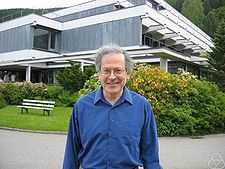Leslie Valiant
| Leslie Valiant | |
|---|---|
 Leslie Valiant in 2005 (photo from MFO) | |
| Born | 28 March 1949 |
| Nationality | United Kingdom |
| Fields |
Mathematics Computer Science |
| Institutions |
Harvard University University of Edinburgh |
| Alma mater |
University of Cambridge Imperial College London University of Warwick |
| Thesis | Decision Procedures for Families of Deterministic Pushdown Automata (1974) |
| Doctoral advisor | Mike Paterson |
| Doctoral students |
Mark Jerrum Michael Kearns Dan Roth Rocco Servedio |
| Known for | Valiant–Vazirani theorem |
| Notable awards |
Turing Award (2010) EATCS Award (2008) Knuth Prize (1997) Nevanlinna Prize (1986) |
Leslie Gabriel Valiant FRS (born 28 March 1949) is a British computer scientist and computational theorist.[1]
Valiant is world-renowned for his work in theoretical computer science. Among his many contributions to complexity theory, he introduced the notion of #P-completeness to explain why enumeration and reliability problems are intractable. He also introduced the "probably approximately correct" (PAC) model of machine learning that has helped the field of computational learning theory grow, and the concept of holographic algorithms. His earlier work in automata theory includes an algorithm for context-free parsing, which is (as of 2010) still the asymptotically fastest known. He also works in computational neuroscience focusing on understanding memory and learning.
Together with Vijay Vazirani, Valiant proved the Valiant–Vazirani theorem.[2]
Valiant's 2013 book is Probably Approximately Correct: Nature's Algorithms for Learning and Prospering in a Complex World (Basic Books, ISBN 9780465032716). In it he argues, among other things, that evolutionary biology cannot explain the rate at which evolution occurs, writing, for example, "The evidence for Darwin's general schema for evolution being essentially correct is convincing to the great majority of biologists. This author has been to enough natural history museums to be convinced himself. All this, however, does not mean the current theory of evolution is adequately explanatory. At present the theory of evolution can offer no account of the rate at which evolution progresses to develop complex mechanisms or to maintain them in changing environments."
Career
Valiant was educated at King's College, Cambridge, Imperial College London, and University of Warwick where he received a Ph.D. in computer science in 1974. He started teaching at Harvard University in 1982 and is currently the T. Jefferson Coolidge Professor of Computer Science and Applied Mathematics in the Harvard School of Engineering and Applied Sciences. Prior to 1982 he taught at Carnegie Mellon University, Leeds University, and the University of Edinburgh.
Awards
He received the Nevanlinna Prize in 1986, the Knuth Prize in 1997, the EATCS Award in 2008,[3] and the ACM Turing Award in 2010.[4][5] He is a Fellow of the Royal Society (London), a Fellow of the American Association for Artificial Intelligence, and a member of the National Academy of Sciences (USA).
References
- ↑ Hoffmann, L. (2011). "Q&A: Leslie Valiant discusses machine learning, parallel computing, and computational neuroscience". Communications of the ACM 54 (6): 128. doi:10.1145/1953122.1953152.
- ↑ Valiant, L.; Vazirani, V. (1986). "NP is as easy as detecting unique solutions". Theoretical Computer Science 47: 85–93. doi:10.1016/0304-3975(86)90135-0.
- ↑ David Peleg The EATCS Award 2008 - Laudatio for Professor Leslie Valiant European Association of Theoretical Computer Science.
- ↑ Josh Fishman "‘Probably Approximately Correct’ Inventor, From Harvard U., Wins Turing Award" Chronicle of Higher Education March 9, 2011.
- ↑ ACM Turing Award Goes to Innovator in Machine Learning ACM Computing News
External links
- Leslie Valiant at the Mathematics Genealogy Project
- DBLP:Leslie G. Valiant publications in DBLP
- Leslie Valiant - Harvard Homepage
| |||||
| |||||
| |||||
|